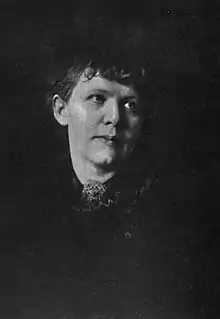Helene Böhlau
Helene Böhlau (German: [he.ˈleː.nə ˈbøː.laʊ̯] (![]() listen); 22 November 1859 in Weimar – 26 March 1940 in Augsburg) was a German novelist.[1]
listen); 22 November 1859 in Weimar – 26 March 1940 in Augsburg) was a German novelist.[1]

Portrait of Helene Böhlau
Biography
She traveled much in the East, married Omar al-Raschid Bey (born as Friedrich Arnd) at Istanbul, and settled down in Munich. In 1888 her sketches of Weimar (Ratsmädelgeschichten) brought her a large measure of fame. She showed now and then a leaning toward the Romantic school, but on the whole her high power of description is realistic and her writings are imbued with passion.
Works
- Novellen (1882)
- Es hat nicht Sein Sollen (It shouldn't have been, 1891)
- Das Recht der Mutter (The mother's right, 1896; new ed., 1903)
- Neue Ratsmädel- und Weimarische Geschichten (1897)
- Halbtier (Half animal, 1899)
- Sommerbuch (1902)
- Die Kristallkugel (The crystal ball, 1903)
- Isebies (1911)
Notes
_Ratsm%C3%A4del.jpg.webp)
Helene Böhlau's Ratsmädel series made the daughters of Weimar Burgermeister Friedrich Kirsten known in all of Germany: Memorial tablet at Windischenstraße 13 in Weimar
- German Wikipedia says she was born in 1856.
References
- This article incorporates text from a publication now in the public domain: Rines, George Edwin, ed. (1920). . Encyclopedia Americana.
External links
- Works by or about Helene Böhlau at Internet Archive
- Works by Helene Böhlau at LibriVox (public domain audiobooks)

This article is issued from Wikipedia. The text is licensed under Creative Commons - Attribution - Sharealike. Additional terms may apply for the media files.